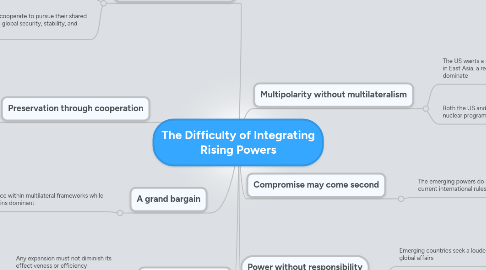
1. Preservation through cooperation
1.1. Americans are willing to share the world's burdens
1.1.1. The US will have to become a more consistent exemplar of multilateral cooperation
1.2. The US has been picking and choosing among multilateral treaties, institutions, and initiatives
1.2.1. Such a selective approach is running into trouble because those powerful enough to afford picking and choosing are growing more numerous
2. A grand bargain
2.1. Influence within multilateral frameworks while it remains dominant
2.1.1. The US must not allow the emerging powers to avoid contributing to global public goods
2.1.1.1. Any new permanent seats should be granted only to those states that make tangible efforts to foster international peace and security
3. Change from within
3.1. Any expansion must not diminish its effectiveness or efficiency
3.1.1. Reallocating influence within existing bodies will be an uphill battle
3.2. The more important the institution, the more its powerful members will resist diluting their authority within it
3.2.1. China and Russia oppose allowing any new permanent members to join the UN Security Council
4. Testing Obama's Ambitions
4.1. Brazil and Turkey voted against additional sanctions
4.1.1. Brazilian-Turkish strategy failed to halt UN Security Council action against Iran
4.2. Responsible stakeholder principle to all rising nations
4.2.1. New and emerging powers who seek greater voice and representation will need to accept greater responsibilities for meeting global challenges
4.3. US should cooperate to pursue their shared interests in global security, stability, and prosperity
5. Multipolarity without multilateralism
5.1. The US wants a stably balance of power in East Asia, a region that China seeks to dominate
5.2. Both the US and China want the North Korean nuclear program eliminated
5.2.1. Washington places a high priority on this objective
5.2.2. Beijing seeks above all to preserve cordial relations with Pyongyang
6. Compromise may come second
6.1. The emerging powers do not accept all the current international rules
6.1.1. The emerging nations are intent on altering existing rules
6.1.1.1. They believe that they are entitled to reshape international arrangements to suit themselves
7. Power without responsibility
7.1. Emerging countries seek a louder voice in global affairs
7.1.1. However they remain committed to lessen poverty within their own borders
7.1.1.1. They resist global initiatives that would slow their domestic growth
